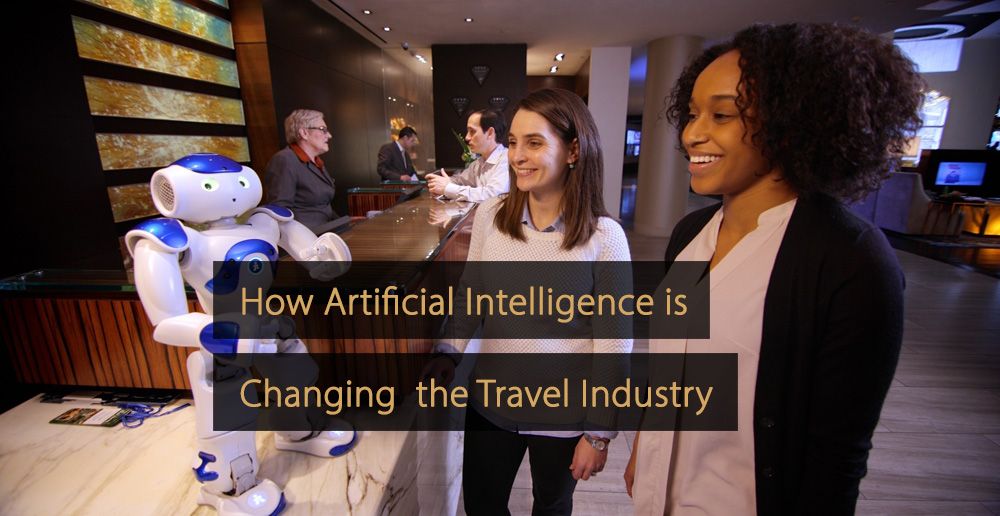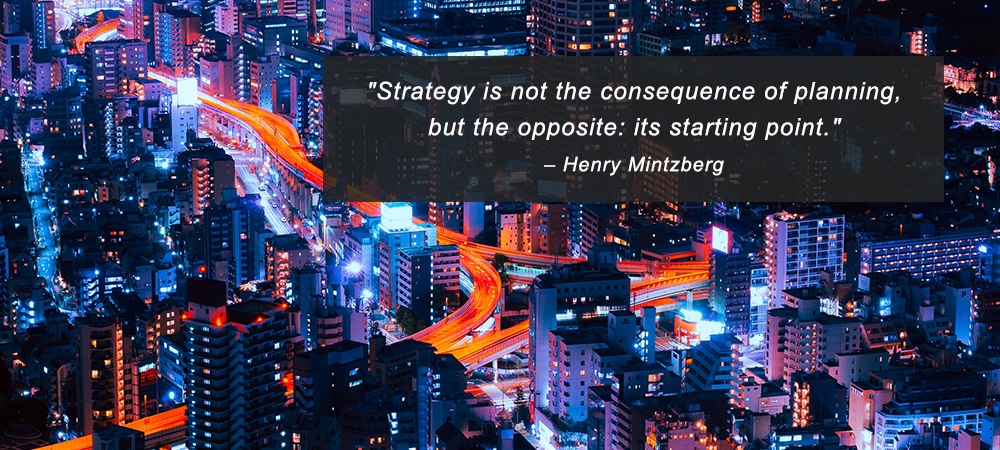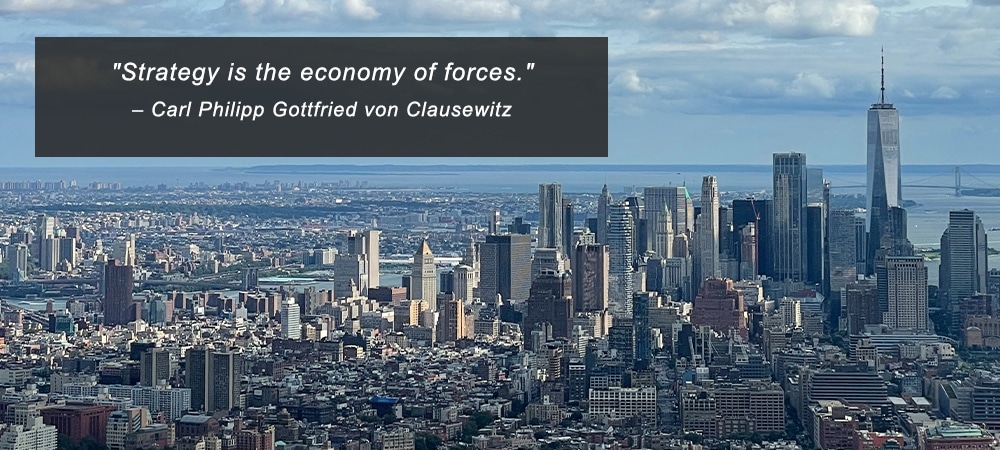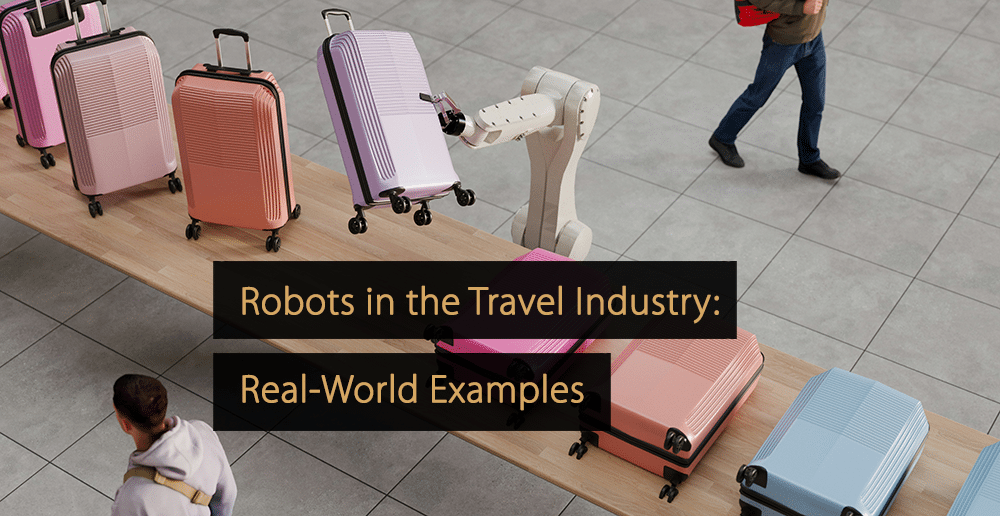Artificial intelligence is constantly improving, making it more reliable and attractive as a business solution. In particular, businesses in the travel industry are taking advantage of AI to perform various administrative and customer service tasks. Here, you will learn the uses and benefits of artificial intelligence and explain how it is changing how travel companies operate.
Table of Contents:
- Understanding Artificial Intelligence
- The Role of AI Within the Travel Industry
- Examples of AI Within the Travel Industry
- 1. Chatbots and Online Customer Service
- 2. Face-to-Face Customer Service
- 3. Data Processing and Data Analysis
- 4. Voice-Based Digital Assistance
- 5. Flight Forecasting
- 6. Social Media Channel Analysis
- 7. Flexible Pricing
- 8. Smart Baggage Handling
- 9. AI Face Recognition
- 10. Personalized Travel
- 11. Managing Travel Disruption
- 12. AI-Powered Revenue Management
- 13. Assisted Airplane and Airspace Maintenance Reports
- 14. Employee Management Schedulers
- 15. Pricing and Demand Predictions
- 16. Facilitating Customer Loyalty Programs
- 17. Detecting and Preventing Payment Fraud
- 18. Travel Disruption Communication
- 19. Automated Customer Service Tasks
- 20. Predictive Maintenance Systems
- 21. Business Travel Planning Using AI
- 22. Smart Beds and Sleep Technology
- 23. Intelligent Airport Operations Management
- Virtual Reality & Augmented Reality
Understanding Artificial Intelligence
The concept of artificial intelligence, or AI, is often discussed but can be slightly more difficult to define. Essentially, it refers to computers or machines performing tasks that would normally require human intelligence to carry out. This could, for example, be learning lessons, making decisions, or recognizing and interpreting speech.
Artificial intelligence has existed for decades, but it is only relatively recently that computers and other machines have become advanced and reliable enough to carry out complex tasks without assistance. The concept is strongly linked to ideas of automation, where processes are carried out with little or no human intervention.
In the modern age, it is an accepted fact that businesses will collect and store vast quantities of data. This can help to enable AI, with machines using the data to perform tasks ranging from data analysis and problem-solving to speech translation, direct messaging, and improving personalization during the customer journey. According to the Artificial Intelligence (AI) Market Size Worldwide Report by Statista, the global AI market size is projected to reach $1,847,495.6 million by 2030.
The Role of AI Within the Travel Industry
The capacity for artificial intelligence to perform tasks that have traditionally required human cognitive function has made it especially useful for those in the travel industry because deploying AI can save businesses time and money while potentially eliminating human error and allowing tasks to be performed quickly, at any time of the day.
Most hotels and resorts rely heavily on delivering excellent customer service to build their reputation, and AI technology can assist with this in various ways. For example, artificial intelligence can improve personalization, tailor recommendations, and guarantee fast response times, even without staff.
Artificial intelligence has advanced to the point where it is regularly used to assist and communicate with customers, ‘learning’ from each of these interactions and improving future interactions. Moreover, AI can assist with tasks like data analysis, calculations, and problem-solving, which can be valuable to hotel owners.
Examples of Artificial Intelligence (AI) Within the Travel Industry
The role of artificial intelligence within the business world has increased dramatically over the past decade, and the last few years, in particular, have seen much more widespread adoption in the travel industry. Below, you find three of the most significant ways the technology is deployed.
1. Chatbots and Online Customer Service
For hotels and other businesses in the tourism industry, one of the most exciting uses for artificial intelligence is assisting customers online. In particular, there has already been widespread adoption for the purposes of powering chatbots on social media platforms, as well as instant messaging apps. According to the Chatbot Market Report by Markets and Markets, the global chatbot market size is projected to reach $15.5 billion by 2028.
Used in this way, AI can respond to questions and provide valuable information to customers, even when a customer service rep is not available. Customers demand faster and faster response times on online platforms, and artificial intelligence allows businesses to deliver times that would be impossible for humans.
Video: Sam, intelligent travel chatbot!
2. Face-to-Face Customer Service
While the use of artificial intelligence for powering online customer service is now relatively commonplace, one of the emerging trends is for the technology to be used for face-to-face customer service interactions. This can cut queues at information or reception desks and improve overall efficiency.
One example of this technology in action is the AI robot ‘Connie’, deployed by Hilton. This robot uses artificial intelligence and speech recognition to provide tourist information to customers who speak to it. Each human interaction also helps to teach the robot, improving the quality of all future communications.
Video: Meet Connie, Hilton Hotels’ First Robot Concierge
3. Data Processing and Data Analysis
Finally, it is important to understand that the applications of AI within the travel and tourism industry are not limited to customer service alone. One of its most popular and effective uses is for gathering and interpreting data to draw conclusions about customers, business practices, and pricing strategies.
The key advantage of artificial intelligence in this particular field is its ability to sort through huge amounts of data quickly and accurately. In contrast, the equivalent for humans would take significantly longer and potentially contain more errors. The Dorchester Collection hotel, for instance, has used AI to sort through customer feedback from surveys, reviews, and online polls to build a clearer picture of current opinion in real-time.
4. Voice-Based Digital Assistance
An emerging use for artificial intelligence in the travel and tourism industry involves providing voice-based digital assistance, which can take many forms. For instance, it is now possible to provide voice assistants within hotel rooms, allowing guests to ask questions or make requests and receive an immediate response.
Voice recognition technology opens up the potential for voice-activated room controls and instant 24/7 access to tourist information. Robots could also provide voice-based digital assistance, meaning that customer service desks can be left without human staff members, especially outside of peak times.
Video: PolyAI Voice Assistant Industry Demo: Travel
5. Artificial Intelligence Flight Forecasting
The use of AI within the travel and tourism industry is also increasingly influencing flight forecasting. This discipline relies on currently available data and historical flight data. Artificial intelligence can be invaluable when analyzing vast quantities of data and identifying relevant trends.
Drawing from this data, AI-powered software can use weather patterns, past flight times, and trends related to flight speed to accurately forecast when flights will arrive and how long delays are likely to last. As a result, those using the software can benefit from access to more reliable and accurate projections.
Table: AI Application Examples in Flight Forecasting
| AI Application | Benefits | AI Techniques/Methods |
|---|---|---|
| Weather Prediction | Enhanced accuracy in weather forecasting for flight planning. Reduction in weather-related disruptions and delays. |
Machine learning models trained on historical weather data. Neural networks for pattern recognition in weather patterns. |
| Demand Forecasting | Accurate prediction of passenger demand for flight schedules. Efficient allocation of aircraft and crew resources. |
Time series analysis to model demand trends. Forecasting algorithms using historical booking data. |
| Aircraft Maintenance | Predictive maintenance reduces unscheduled downtime and cancellations. Extends the lifespan of aircraft components. |
Predictive analytics using sensor data from aircraft components. Condition-based monitoring and fault prediction using AI. |
6. Social Media Channel Analysis
Artificial intelligence in the travel and tourism industry also has a valuable role to play when it comes to social media. In particular, businesses in the industry can use AI to better understand how users engage with their social media channels and what those users say.
Some social media channels attract many interactions daily, and it can be almost impossible to check and analyze them manually. With artificial intelligence, key trends can be identified, the most common sentiments can be understood, and companies can better understand their audience.
Video: How Sentiment Analysis Works
7. Flexible Pricing
Many businesses within travel and tourism operate with a flexible pricing model based on the levels of demand being experienced and the level of availability. This applies for hotels, airlines, and various other business types, and AI within the travel and tourism industry can play an important role in optimizing such a strategy.
With AI’s ability to quickly organize and analyze data, it becomes significantly easier to adjust pricing intelligently and ensure that the level set makes sense. During times of high demand, pricing can typically be set higher than during times of low demand, but there are other factors that AI can utilize to make intelligent calculations.
Video: Transforming Dynamic Pricing in Travel Industry through AI
8. Smart Baggage Handling
The use of artificial intelligence within the travel and tourism industry also extends to baggage handling and security. AI can be used to sort baggage more efficiently, reducing the kind of mistakes that lead to lost baggage. On top of this, AI can help to sort unclaimed, misplaced, or lost baggage.
AI technology can also be deployed for security. For example, when airport security systems scan luggage, AI can automatically scan images and detect possible items of interest. An alert system can then be set up, attracting the attention of security staff if something suspicious is found.
Video: The Future Of Baggage
9. Artificial Intelligence (AI) Face Recognition
Artificial intelligence technology is the underlying technology behind automated facial recognition capabilities. This technology compares real-time images with images on a database, using facial features to identify individuals. The best facial recognition technology can identify individuals in seconds.
Facial recognition using AI in the travel and tourism industry is commonly deployed for security purposes. For example, within airports, it can be used to detect people of interest. In some cases, facial recognition can also be used to establish how many people are in a particular area, which can also be valuable for safety and security.
Video: How Facial Recognition Will Change The Way You Travel
10. Personalized Travel
The travel and tourism industry also uses AI technology at the beginning of the customer journey to provide a more personalized travel experience. This is most commonly seen with websites offering hotel, flight, or other travel-related bookings, where intelligent recommendations can be made during this booking journey.
For example, artificial intelligence can utilize information from a user’s website exploration to make tailored recommendations for hotels or destinations based on what that user has been searching for or looking at. This can work in the same way retailers like Amazon recommend products based on past purchases or browsing. AI chatbots can also be deployed to answer customers’ questions while booking.
Video: How Kayak Is Using AI for Travel Planning
11. Managing Travel Disruption
Forecasting is one of the single biggest uses of artificial intelligence within the travel and tourism industry, and this can potentially be used to reduce travel disruption significantly and manage any issues that arise.
For example, AI can use historical data to identify trends that can then be used to predict the likelihood of flight delays accurately. Alternatively, AI can gather data from weather forecasts, compare this with past data, and provide guidance or advice on whether disruption is likely and how issues can be resolved.
12. Artificial Intelligence (AI)-Powered Revenue Management
Revenue management is the process of selling the right product to the right customer at the right time, for the best price, in the most efficient way. It is a data-driven discipline, which is why artificial intelligence can be beneficial, helping those in the travel and tourism industry to maximize their earnings.
AI makes it easier to sort through all of the available data. This could include existing bookings, the number of rooms or seats available, upcoming events, and historical data on demand levels at the same time of the year. From there, the AI can automatically adjust pricing and distribution strategies to optimize financial results.
Video: Revenue Management Revolution
13. Assisted Airplane and Airspace Maintenance Reports
Predictive analytics is a field that airlines are investing heavily in because it can save them significant money lost when unexpected issues arise, requiring airplanes to be grounded.
Artificial intelligence and predictive analytics can be used to understand when maintenance is likely needed and anticipate problems before they arise. When airlines and others in the travel and tourism industry use AI in this way, they can take action at the time that is least likely to cause upheaval.
Video: AI: The Future Of Intelligent Maintenance
14. Employee Management Schedulers
Hotels, airlines, and other travel and tourism businesses can use AI to improve employee management and scheduling. In companies with many employees, creating a work schedule can be a complicated and time-consuming process, with many moving parts that need to be factored into any decisions.
With artificial intelligence, viable work schedules can be created automatically, factoring in all available data, including the number of hours each employee has worked, the need for senior staff on each shift, the hours each employee is contracted to work, any approved holidays, and the necessary time off between two shifts.
Video: AI-Powered Workforce Management
15. Pricing and Demand Predictions
Modern customers are always looking for the best prices, but many factors can influence hotel room rates, flight fares, and the prices of other products and services within the industry. Software powered by artificial intelligence can help travel and tourism industry customers to better understand fluctuations in prices.
For instance, the software may be able to alert users that hotel room rates in a particular destination are likely to increase. At the same time, the software can help customers to understand spikes or dips in demand, which allows them to book travel or hotels at the best possible time.
16. Facilitating Customer Loyalty Programs
Customer loyalty programs serve an important function by offering incentives for customers to return to a business repeatedly. However, for a successful customer loyalty program to achieve this, the rewards on offer need to be worthwhile, and this is another area where the travel and tourism industry and AI go hand-in-hand.
Using online tracking, transaction histories, and personal preferences obtained during sign-up, AI can provide loyalty scheme members with personalized rewards that keep customers coming back.
Video: AI – Machine Learning in Loyalty Programs
17. Detecting and Preventing Payment Fraud
Travel and tourism businesses deal with many types of payment fraud, and AI can be a valuable tool in detecting and preventing many of these issues. One of the main ways this can be achieved is through pattern recognition and behavioral analysis.
By analyzing data from previous fraud cases, it may be possible to identify attempted payment fraud before any serious damage is done. Alerts can be set up to flag suspicious activity for human intervention.
Video: Visa’s artificial intelligence (A.I.) for fraud detection
18. Travel Disruption Communication
Travel disruption can take many forms, from delayed planes or trains to lost baggage or lengthy queues for security. However, one of the most critical things for travel companies to get right is their communication with customers, who need constant access to the most up-to-date information.
When issues occur, AI can be used to convey messages to travelers. Automated emails and text messages can be sent when delays are expected, and the AI can also potentially calculate how long those delays are likely to take. Meanwhile, chatbots powered by AI are used throughout the travel and tourism industry, answering travelers’ questions.
19. Automated Customer Service Tasks
The role of artificial intelligence in travel industry businesses is fundamentally altering customer service. AI systems can provide rapid responses to common questions and even guide customers through booking processes. Automation of this kind is important for reducing labor costs and improving the productivity of customer service teams. Staff can spend less time on routine customer service tasks and more time on more challenging issues.
Some of the key benefits of AI for customer service include 24/7 availability, the capacity to handle multiple requests at once and the ability to deliver swift response times, often exceeding customer expectations. Many airlines and hotels are now using systems that can also communicate in multiple languages.
20. Predictive Maintenance Systems
Predictive maintenance systems make use of AI to analyze data from technology and equipment. Doing so allows the systems to anticipate maintenance needs and identify potential problems before they occur. This is one of the most exciting uses of artificial intelligence in travel industry settings, as it can reduce downtime for systems and technology. Businesses can avoid the loss of revenue linked to outages or breakdowns.
Some airlines have already implemented AI-powered predictive maintenance systems and achieved significant reductions in unscheduled maintenance work. The technology can prevent delays and enhance the customer experience. Taking proactive steps can also reduce the severity of any technology issues, reducing maintenance costs.
21. Business Travel Planning Using AI
AI-powered travel planning tools can enable travel managers to automatically create budget-friendly travel plans. This can include identifying ideal transportation and accommodation options. Using automation tools may speed up the travel planning process, while avoiding unnecessary waste or inefficiencies. This could reduce a business’ travel planning expenditure, while easing travel managers’ workloads.
The most up-to-date travel planning tools on the market will use artificial intelligence and travel industry data. The tools can then automatically create itineraries that match your budget, travel policies and schedule. AI-powered translation services can also be used during this process to break down language barriers.
Video: 4 AI Travel Apps to Revolutionize Your Trip Planning
22. Smart Beds and Sleep Technology
The artificial intelligence travel industry revolution has led to the development of AI-powered ‘smart beds’ and sleep technology. This technology can monitor guests’ sleep and make adjustments to improve sleep quality. Sleep technology is of growing importance because wellness is an increasingly popular component of travel. By improving sleep quality, guests can have a more positive experience in a hotel.
Smart sleep technology will typically monitor heart rate, movement, breathing patterns and body temperature. A smart bed may then be able to automatically adjust room temperature, or notify guests of issues like sleep apnea. Over time, guests can build up their own personal sleep profile, with the smart bed adjusting to their preferences. This could also allow the sleep technology to notice any changes in sleep from previous visits.
23. Intelligent Airport Operations Management
One of the most interesting uses of artificial intelligence in the travel industry is linked to airport operations management. Here, it analyzes passenger movements, queues and security processes to make intelligent suggestions. Many airlines are now dealing with more passengers than ever before and operations need to be able to withstand this increase in demand. Using AI, it is easier to anticipate passenger flow and respond accordingly.
For example, AI and machine learning can combine with smart camera systems to carefully analyze passenger numbers and flow. This can then allow the system to automatically assign staff to the places they are most needed. Ultimately, the technology can improve efficiency, reduce delays and enhance the airport experience for passengers.
Virtual Reality & Augmented Reality
Would you like to learn more about other digital technologies that can benefit your business? Have also a look at the articles “How Virtual Reality is Transforming the Travel Industry” and “How Augmented Reality is Revolutionising the Travel Industry”.
Artificial Intelligence in Travel Industry FAQs
More Innovating Technologies Within Travel
With technology continuously evolving, it should come as little surprise that its applications within the travel industry evolve too. In the following articles, we piled up more innovative technologies in today’s travel and tourism industry.
- Blockchain Technology and Its Uses in the Travel Industry
- Robots in the Travel Industry: 8 Real-World Examples
- How the Internet of Things (IoT) Can Benefit the Travel Industry
- How Can Voice Control Benefit the Travel Industry?
- 4 Ways Facial Recognition Can Be Used in the Travel Industry
- Metaverse Travel: How the Metaverse Will Change the Travel Industry
More Tips to Grow Your Business
Revfine.com is the leading knowledge platform for the hospitality and travel industry. Professionals use our insights, strategies, and actionable tips to get inspired, optimize revenue, innovate processes, and improve customer experience.Explore expert advice on management, marketing, revenue management, operations, software, and technology in our dedicated Hotel, Hospitality, and Travel & Tourism categories.










While 95% of customer value high-quality support over speed, delivering both is vital in this competitive age. Integrating live chat into your CX strategy will be a game-changer.
A great piece that sheds much-needed light on AI technology and its impact on the hospitality business as there are many new details you posted here.
Thanks for sharing this article about AI. As a tech person, I am always hoping to grow my viewpoint.
Artificial intelligence has transformed the way we live, work, and communicate with each other. From personal assistants to advanced systems used in healthcare and finance, AI is changing the world at an unprecedented pace. With technology continuously evolving, it should come as little surprise that its applications within the travel industry grow too.
Artificial Intelligence is truly shifting the way businesses operate and connect with the market, and the travel and hospitality industry is no exception.
Travel companies can use chatGPT for content creation. This way, tourism professionals can ask for assistance from chatGPT to create content, excursions, or day-to-day itineraries. Really helpful!
Artificial Intelligence (AI) refers to developing and deploying computer systems that can perform tasks that typically require human intelligence. Thanks for sharing this informative article.
I love how AI is changing the travel industry! It makes planning trips so much easier and more efficient.
Nice article about AI in travel! Your generosity has enriched this post into a goldmine of unparalleled information.
Excellent article on the impact of artificial intelligence in the travel industry! I appreciated how clearly and concisely you explained the benefits of AI, such as personalizing travel experiences and improving recommendations. Your in-depth analysis highlighted how AI helps businesses optimize processes and deliver quality customer service. Bravo for this informative and well-written article!
Artificial Intelligence is transforming the travel industry, and observing how it is being incorporated into the development of travel apps is intriguing. AI improves the travel experience by offering personalized recommendations and instant customer support through chatbots. It also assists travelers in making informed decisions with predictive analytics and simplifies the booking process with image recognition. As the travel sector advances, AI-driven apps are becoming essential for travelers and businesses. It is thrilling to see this transformation and the creative ways AI shapes the future of travel.
I found this article interesting. I never realized how much AI is transforming the travel industry. From personalized recommendations to automated booking, it’s fantastic to see how AI streamlines the travel experience. I’m looking forward to seeing how these technologies continue to evolve and improve!
I found this article fascinating, especially the section on how AI-powered chatbots revolutionize customer service in the travel industry. As a frequent traveler, I can’t wait to see how AI will continue to improve my travel experiences in the future!
The impact of AI on the travel industry is fascinating. From personalized recommendations to automated booking processes, AI is revolutionizing the way we travel. It’s exciting to think about the endless possibilities for innovation and improvement in this space!